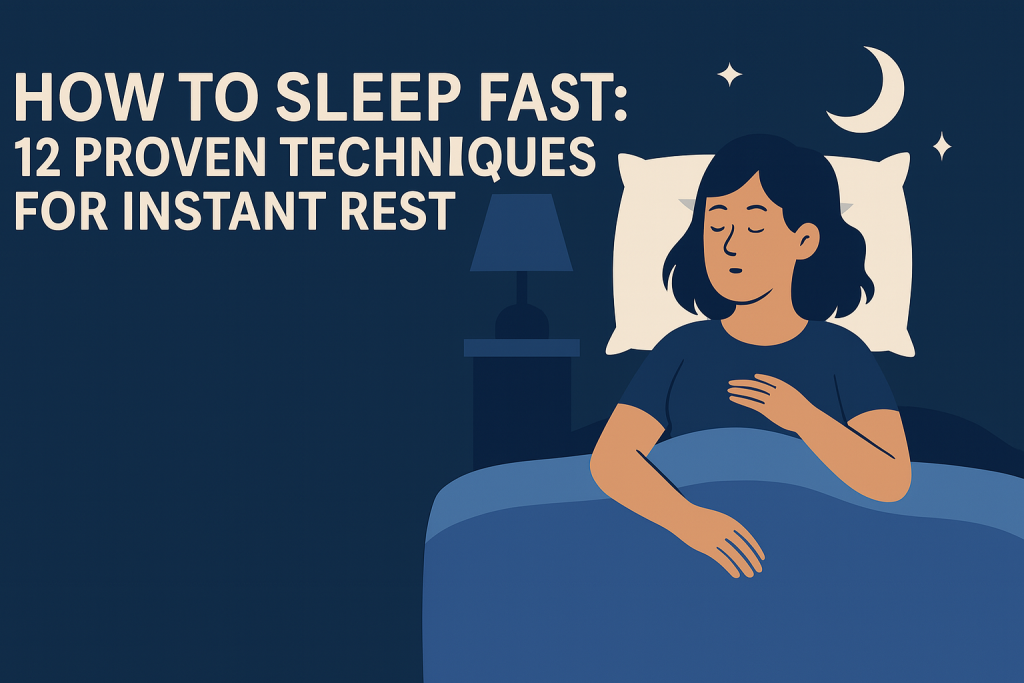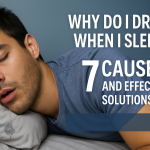Understanding the Science Behind Falling Asleep
Getting to sleep quickly is something many people struggle with. In today’s fast-paced world, stress, screens, and lifestyle choices often interfere with our natural sleep cycles. Understanding the science of sleep is the first step in improving how fast you can fall asleep.
Your body’s sleep-wake cycle is regulated by circadian rhythms and the production of the hormone melatonin. Disruptions to this process — like late-night screen time, caffeine, or irregular schedules — can leave you lying awake for what feels like forever.
Quality sleep isn’t just about duration, but also how quickly and deeply you fall asleep. Research shows that adults should aim for 7-9 hours of restful sleep, and falling asleep within 10-20 minutes is considered healthy. Let’s dive into actionable steps to help you attain this goal every night.
12 Effective Methods to Fall Asleep Faster
Below are 12 proven tips and techniques that can help you drift off quickly and enjoy a night of restful sleep. These strategies are backed by sleep experts and supported by scientific research.
- Establish a consistent sleep schedule
- Limit screen time before bed
- Create a relaxing bedtime routine
- Optimize your bedroom environment
- Practice mindful breathing exercises
- Try the 4-7-8 breathing technique
- Engage in progressive muscle relaxation
- Limit caffeine and alcohol intake
- Use sleep-friendly scents, like lavender
- Exercise regularly, but not too close to bedtime
- Manage stress and racing thoughts
- Use natural sleep aids when necessary
Build a Consistent Sleep Schedule
Go to Bed and Wake Up at the Same Time
Sticking to a regular sleep schedule reinforces your body’s circadian rhythm. Going to bed and waking up at the same time every day — even on weekends — helps your body know when it’s time to rest. This predictability makes it easier to fall asleep quickly.
Limit Naps During the Day
Daytime naps can interfere with your sleep drive, especially if they are long or taken late in the afternoon. If you do nap, limit it to 20-30 minutes and avoid napping after 3 PM.
Optimize Your Bedroom for Sleep
Control Light, Temperature, and Noise
Your environment plays a huge role in how fast you fall asleep. Make your bedroom a restful sanctuary by keeping it cool (around 65°F or 18°C), dark, and quiet. Blackout curtains, earplugs, or a white noise machine can help eliminate disturbances.
Invest in Comfortable Bedding
Quality pillows and a supportive mattress can make a significant difference in how quickly you drift off. Choose breathable fabrics and keep your sleep area clutter-free for a calming effect.
Limit Screen Time and Electronics
Avoid Blue Light Before Bed
The blue light emitted from phones, tablets, and computers suppresses melatonin production, making it harder to fall asleep. Aim to turn off all screens at least 30–60 minutes before bedtime for better sleep results.
Try Alternative Activities
Instead of scrolling through your phone, try reading a paperback book, journaling, or listening to relaxing music to signal your brain that it’s time to wind down.
Create a Relaxing Bedtime Routine
Establish Soothing Pre-Sleep Habits
Having a bedtime routine helps your mind and body transition from alertness to relaxation. This may include taking a warm bath, gentle stretches, or sipping herbal tea. The key is consistency and choosing activities that cue relaxation.
Incorporate Mindfulness or Meditation
Guided meditation apps or deep breathing exercises can calm your thoughts and prepare your body for restful sleep. Even 5-10 minutes of mindfulness can make a noticeable difference.
Practice Mindful Breathing and Relaxation Techniques
The 4-7-8 Breathing Technique
This popular breathing method, developed by Dr. Andrew Weil, can promote relaxation and help you fall asleep faster. Here’s how:
- Inhale quietly through your nose for 4 seconds.
- Hold your breath for 7 seconds.
- Exhale slowly through your mouth for 8 seconds.
- Repeat the cycle 3-4 times.
This technique helps slow your heart rate and signals to your brain that it’s time to sleep.
Progressive Muscle Relaxation
Gradually tensing and relaxing each muscle group in your body can help you release physical tension and mentally prepare for sleep. Start at your toes and work your way up to your head, focusing on each muscle for a few seconds at a time.
Watch Your Diet and Limit Stimulants
Avoid Caffeine and Alcohol Before Bed
Caffeine is a powerful stimulant that can linger in your system for up to 8 hours, making it hard to fall asleep. Likewise, while alcohol may make you feel sleepy initially, it disrupts your sleep cycle and lowers sleep quality. Limit both, especially in the hours leading up to bedtime.
Opt for Light, Sleep-Friendly Snacks
If you need a snack before bed, choose foods that promote sleep, such as bananas, almonds, or a small bowl of oatmeal. Avoid spicy or heavy meals that can cause discomfort or indigestion.
Leverage Natural Sleep Aids and Scents
Try Aromatherapy
Scents like lavender, chamomile, and sandalwood have been shown to promote relaxation and improve sleep quality. Use essential oils, pillow sprays, or diffusers to create a calming atmosphere in your bedroom.
Use Melatonin Supplements with Caution
Melatonin supplements can help reset your internal clock, especially if you’re traveling or experiencing jet lag. However, always consult a healthcare professional before starting any new supplement, and use the lowest effective dose for the shortest time needed.
Exercise Regularly—But Not Right Before Bed
Best Time for Physical Activity
Regular exercise can make it easier to fall asleep and improve overall sleep quality. Aim for at least 30 minutes of moderate exercise most days, but avoid vigorous activity within two hours of bedtime, as it can increase adrenaline levels and body temperature.
Incorporate Yoga or Stretching
Gentle yoga or stretching routines in the evening can help release tension, promote relaxation, and prep your body for sleep. Even a short, calming routine can make a noticeable difference in how quickly you fall asleep.
Manage Stress and Quiet a Racing Mind
Journaling Before Bed
Writing down your thoughts or making a to-do list for the next day can help clear your mind and reduce anxiety, making it easier to sleep. Studies show that journaling for just 5 minutes can significantly decrease the time it takes to fall asleep.
Practice Gratitude or Visualization
Shifting your focus to positive thoughts or visualizing calming scenes can help replace stress with relaxation. Try listing things you’re grateful for or imagining a peaceful place to ease your transition into sleep.
When to Seek Professional Help
Identifying Chronic Sleep Problems
If you regularly struggle to fall asleep despite trying these techniques, you may be dealing with insomnia or another sleep disorder. Warning signs include taking longer than 30 minutes to fall asleep most nights, waking up frequently, or feeling fatigued during the day.
Consulting a Sleep Specialist
A sleep specialist can help diagnose underlying issues and recommend tailored treatments, such as cognitive-behavioral therapy for insomnia (CBT-I) or addressing potential medical conditions. Don’t hesitate to seek help if sleep difficulties are impacting your quality of life.
Conclusion: Achieve Instant Rest with Proven Sleep Strategies
Falling asleep quickly is achievable with the right habits and environment. By committing to a consistent sleep routine, limiting stimulants, creating a peaceful bedroom, and practicing relaxation techniques, you can transform your nights and wake up feeling refreshed.
Experiment with these 12 proven methods, and you’ll find the combination that works best for you. Quality sleep is essential for mental and physical well-being, so start prioritizing your rest today for a healthier, more energized tomorrow.


